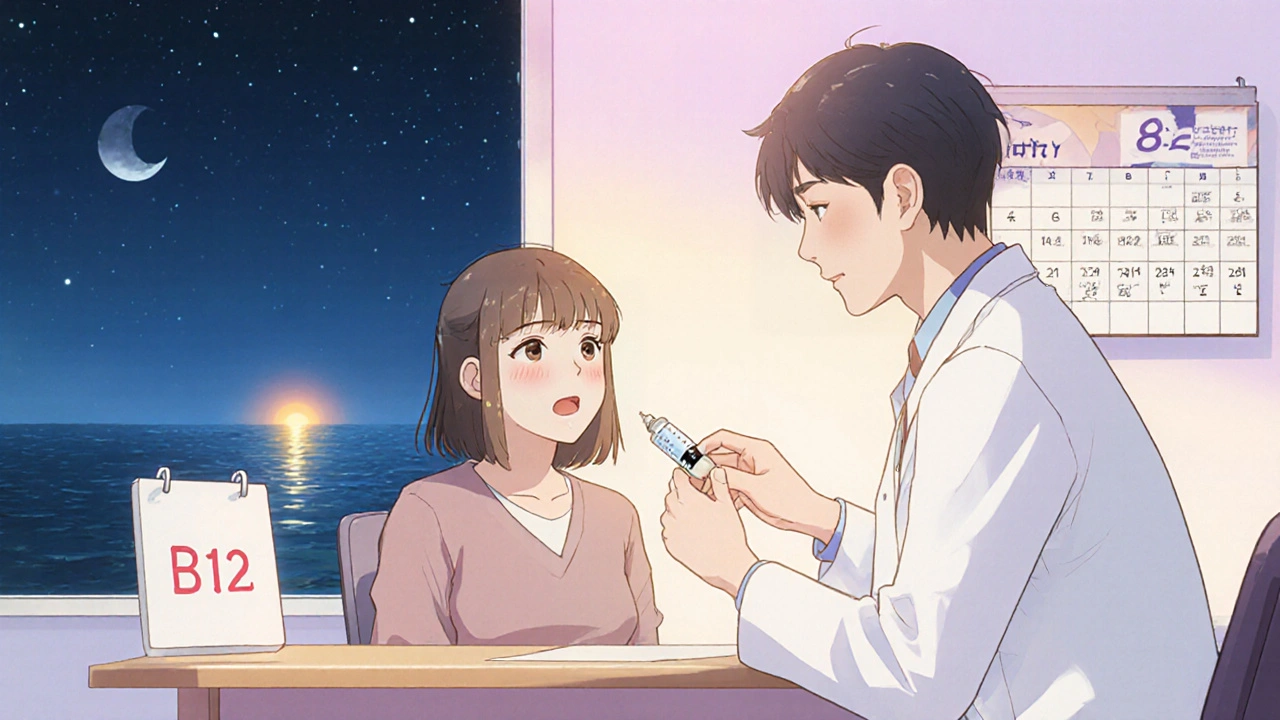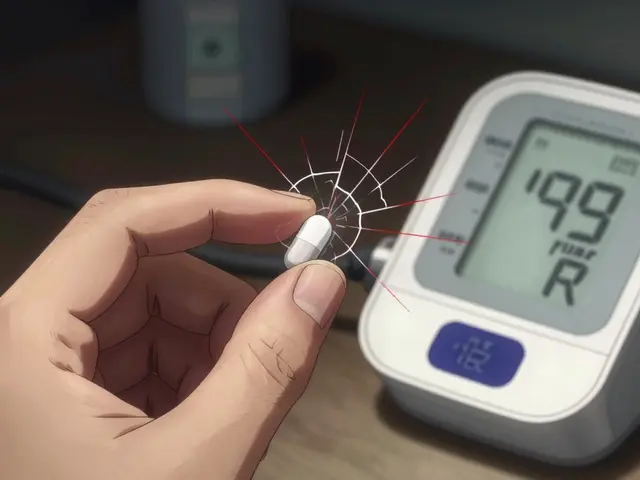B12 Deficiency Risk Calculator
Assess Your Vitamin B12 Deficiency Risk
This tool helps you understand your risk of vitamin B12 deficiency based on your pantoprazole use and other factors. Long-term use of proton pump inhibitors like pantoprazole can reduce B12 absorption.
Risk Assessment Results
Ever wondered why a stomach‑acid pill could mess with your energy levels or mood? pantoprazole is a household name for treating heartburn, but long‑term use can quietly drain your body’s vitamin B12 stores. In this guide we’ll break down how the drug works, why B12 matters, who’s most vulnerable, and what practical steps you can take to stay balanced.
How Pantoprazole Works
When you swallow Pantoprazole is a proton pump inhibitor (PPI) that blocks the H+/K+ ATPase enzyme in stomach lining cells, drastically reducing gastric acid production. By shutting down the “proton pump,” the medication provides fast relief from reflux, ulcers, and Zollinger‑Ellison syndrome.
The reduction in acid is a double‑edged sword. While it soothes the burn, it also alters the chemistry that helps release vitamin B12 from the food you eat.
Connection Between Stomach Acid and Vitamin B12 Absorption
Vitamin B12 (cobalamin) is a water‑soluble vitamin essential for nerve health, red blood cell formation, and DNA synthesis. In the diet, B12 is bound to protein. Stomach acid, mainly hydrochloric acid, separates B12 from that protein, turning it into a free molecule that can combine with Intrinsic Factor - a glycoprotein secreted by the stomach’s parietal cells. The B12‑intrinsic factor complex then travels to the ileum, where dedicated receptors absorb it into the bloodstream.
If acid is suppressed for months or years, that initial release step becomes inefficient. The result? Less B12 makes it to the ileum, leaving the body scrambling for enough to keep nerves and blood cells working properly.
How Long‑Term Use Can Lead to Deficiency
Research shows a clear trend: patients on PPIs for more than a year have up to a 30 % higher risk of low B12 levels compared with non‑users. The risk climbs with higher doses and older age because gastric secretions naturally decline as we age.
Here’s a quick snapshot of the mechanism:
- Reduced gastric acid → incomplete release of B12 from food.
- Less free B12 → weaker binding to intrinsic factor.
- Fewer B12‑intrinsic factor complexes reach the ileum.
- Decreased absorption → gradual depletion of body stores.
Because the body can store several years’ worth of B12 in the liver, symptoms often surface only after prolonged suppression.

Who’s Most at Risk?
Not everyone on pantoprazole will develop a deficiency, but certain groups face a steeper climb:
- Elderly patients - natural acid decline plus medication.
- People with Pernicious Anemia - an autoimmune attack on intrinsic factor‑producing cells.
- Individuals on H2 Blockers combined with PPIs, further dampening acid.
- Vegans and strict vegetarians who already rely on fortified foods or supplements for B12.
- Patients with chronic gastritis or gastric atrophy, where the stomach lining is already compromised.
If you tick any of those boxes, keep a closer eye on your labs.
Spotting the Signs of Low B12
Vitamin B12 deficiency isn’t always obvious, but a few clues show up repeatedly:
- Persistent fatigue or weakness - the blood can’t carry enough oxygen.
- Tingling or numbness in hands and feet - nerve fiber damage.
- Difficulty concentrating or “brain fog” - B12 supports neurotransmitter synthesis.
- Glossy, sore tongue (glossitis) - a classic but often missed symptom.
- Mood swings or mild depression - B12 influences serotonin production.
If you notice two or more of these while on pantoprazole, it’s worth a check‑up.

Testing and Diagnosis
Doctors usually start with a simple blood test. The key markers are:
| Test | What It Shows | Typical Reference Range |
|---|---|---|
| Serum Vitamin B12 | Overall B12 level | 200-900 pg/mL |
| Methylmalonic Acid (MMA) | Cellular B12 activity - rises early in deficiency | <0.4 µmol/L |
| Homocysteine | Another functional marker, elevated in B12 or folate shortage | 5-15 µmol/L |
When serum B12 is borderline, doctors often add MMA or homocysteine to confirm a true deficiency.
Managing the Risk: Strategies and Supplements
There’s no need to quit pantoprazole abruptly - sudden acid rebound can be painful. Instead, consider these practical steps:
- Schedule a periodic B12 test (once a year for low‑risk users, twice for high‑risk).
- Choose a B12 supplement that contains methylcobalamin or cyanocobalamin. Methylcobalamin is the active form used by the nervous system, while cyanocobalamin is cheaper and well‑absorbed when taken sublingually.
- Take oral B12 on an empty stomach or consider a weekly high‑dose (1,000 µg) to bypass the need for intrinsic factor.
- If oral absorption is problematic, ask about a B12 injection - a quick route straight into the bloodstream.
- Evaluate the necessity of pantoprazole. For mild reflux, an H2 blocker like ranitidine or lifestyle changes (elevating head of bed, avoiding late meals) may suffice.
Here’s a quick comparison of common PPIs and their reported impact on B12 levels:
| PPI | Typical Dose | Reported B12 Impact (≥1 yr use) |
|---|---|---|
| Pantoprazole | 40 mg daily | ↑ risk by ~30 % |
| Omeprazole | 20 mg daily | ↑ risk by ~25 % |
| Lansoprazole | 30 mg daily | ↑ risk by ~20 % |
Numbers vary by study, but the trend is clear: the longer and stronger the acid suppression, the higher the B12 odds.
Frequently Asked Questions
Can I take pantoprazole and a B12 supplement together?
Yes. Because supplements bypass the stomach‑acid step (especially sublingual or injectable forms), they safely counteract the drug’s effect. Just keep the timing separate - take the supplement at least 30 minutes before or after your PPI dose.
How long does it take for a B12 deficiency to develop on pantoprazole?
It can take anywhere from 1 to 3 years of daily use for levels to drop significantly, depending on diet, age, and underlying stomach health.
Is it safe to stop pantoprazole abruptly?
Stopping suddenly can cause rebound acid hypersecretion, leading to worse heartburn. Taper the dose over a few weeks under a doctor’s guidance.
What dietary sources can help maintain B12 while on PPIs?
Animal‑derived foods are richest in B12: meat, fish, eggs, and dairy. For vegans, fortified cereals or plant milks are essential, but a supplement is still advisable.
Do other acid‑suppressing drugs share the same B12 risk?
Yes, most PPIs carry similar risk. H2 blockers have a milder effect and generally a lower impact on B12, but high‑dose or long‑term use can still pose a problem.
Bottom line: pantoprazole is a powerful ally against acid, but like any medication, it can have hidden side effects. Regular monitoring, smart supplement choices, and open dialogue with your clinician keep you on the safe side while you enjoy relief from heartburn.








Ron Lanham October 20, 2025
Listen up, folks, because the truth about pantotab miracles is being sugar‑coated by a culture that loves a quick fix. You pop a pill, you think you’ve tamed the dragon of heartburn, and meanwhile the silent thief of your vitality – vitamin B12 – is slipping through the cracks of your bloodstream. The science is crystal clear: proton pump inhibitors choke the very acid that frees B12 from food, and without that acid, your nerves and blood cells start to crumble. It doesn’t matter if you’re a marathon runner or a couch potato; the body’s need for B12 is non‑negotiable, and messing with it is a selfish gamble. I’ve seen patients stumble into depression and neuropathy simply because they trusted a prescription without asking the right questions. The moral here is simple – you have a duty to yourself to monitor, supplement, and never assume a medication is harmless. Ask your doctor for a yearly B12 panel, demand to know the dosage, and if you’re over 60, treat it like a fire alarm you can’t ignore. Don’t be a pawn in the pharma game; take control before the deficiency sabotages your energy, mood, and mental clarity. Every time you ignore the warning signs, you’re essentially signing a waiver for future health crises. So, arm yourself with knowledge, keep a supplement on hand, and never let a convenient pill replace the conversation you should be having with your healthcare provider. It’s your life, your body, and you owe it the respect of staying informed and proactive.
Deja Scott October 20, 2025
From a cultural standpoint, the way we view supplements can vary dramatically across regions, but the underlying principle remains the same – we must honor our bodies by not overlooking essential nutrients. While embracing modern medicine, it’s equally important to respect traditional practices that emphasize balanced diets and regular testing. I’ve observed many patients benefit from a simple quarterly B12 check, especially when they’re on long‑term PPIs. This approach bridges the gap between cutting‑edge pharmacology and time‑tested preventive care, ensuring no one falls through the cracks.
Natalie Morgan October 20, 2025
Check your B12 levels regularly – the deficiency can creep up silently.
Mahesh Upadhyay October 20, 2025
Wow, another reminder that we’re all walking on a thin line of health. The drama of acid suppression isn’t just a medical footnote; it’s a cliffhanger for our nerves and energy. Let’s not pretend it’s harmless.
Rajesh Myadam October 20, 2025
I totally get how unsettling it can feel to learn that a common medication might be draining your B12. It’s okay to feel a bit anxious – that’s a natural response. The good news is that with simple blood tests and an occasional supplement, you can keep everything in balance. Remember, you’re not alone in this, and many have successfully navigated the same concerns.
Andrew Hernandez October 20, 2025
Regular monitoring is key. A yearly check won’t hurt and can catch issues early. Consider a sublingual B12 if absorption is a worry.
Alex Pegg October 21, 2025
Not everyone needs a supplement; the body can adapt.
laura wood October 21, 2025
While adaptation is possible, many people still experience symptoms that affect quality of life. It’s wise to stay proactive and discuss options with your doctor.